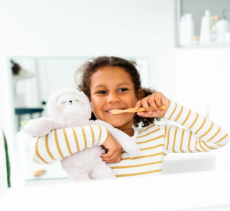Teaching self-care to young children is a valuable part of early childhood development. When children learn how to take care of themselves, they build confidence, independence, and a strong sense of responsibility. Starting these habits early helps create a solid foundation for lifelong wellness and self-awareness.
Start with Simple Routines Begin by encouraging small daily routines that children can manage with minimal assistance. Brushing teeth, washing hands, combing hair, and dressing themselves are all great starting points. Provide step-by-step guidance, and use visual cues like charts or picture cards to help them remember the sequence.
Model Self-Care Behaviors Children learn best by observing adults. When parents and caregivers model self-care, such as eating nutritious meals, getting enough sleep, and taking time to relax, children naturally mimic these habits. Speak openly about why these actions are important, making the learning process feel natural and positive.
Make It Fun and Engaging Turn self-care into a playful experience. Sing songs while washing hands or use fun timers for brushing teeth. Offer praise and small rewards to celebrate their progress. Creating a positive atmosphere around these tasks helps children feel motivated and proud of their independence.
Encourage Emotional Wellness Self-care isn’t just physical. Teach children how to care for their feelings by encouraging them to talk about emotions, take deep breaths when upset, or engage in calming activities like drawing or listening to music. Emotional self-care fosters resilience and empathy.
Create Consistency Children thrive on routine. Set regular times for waking up, meals, and bedtime. Predictable schedules give young children a sense of security and help them understand the importance of caring for their bodies and minds every day.
Provide Choices Offer simple choices within self-care routines, such as picking between two outfits or choosing a snack from healthy options. This builds decision-making skills and helps children feel more involved in their own care.
Celebrate Progress, Not Perfection Self-care is a learning process. Acknowledge efforts rather than expecting flawless execution. Whether a child buttoned their shirt a little crooked or missed a spot while brushing, praise their attempts and gently guide them. Encouragement strengthens their motivation to keep trying.
By promoting self-care in young children through consistent, supportive, and enjoyable methods, we empower them with the tools they need to grow into healthy, confident individuals. Every small step toward independence is a big leap in building lifelong well-being.


